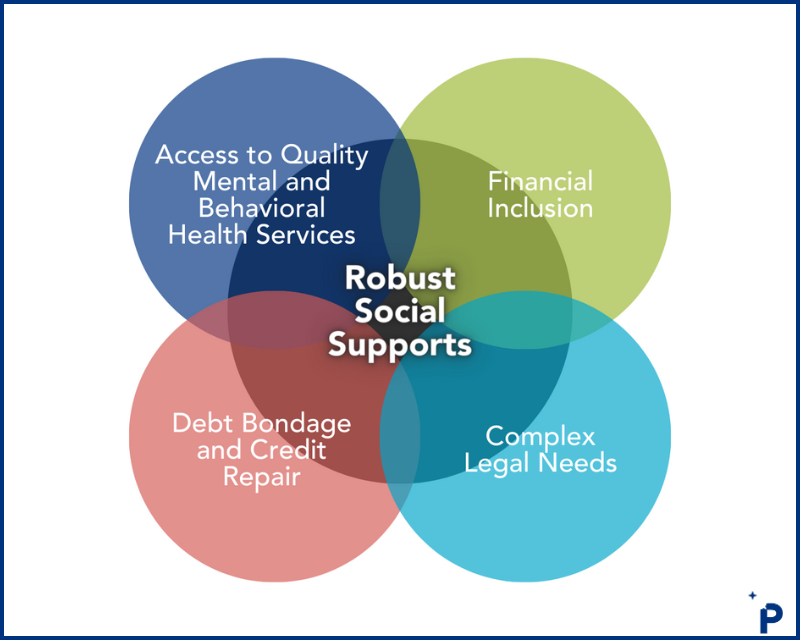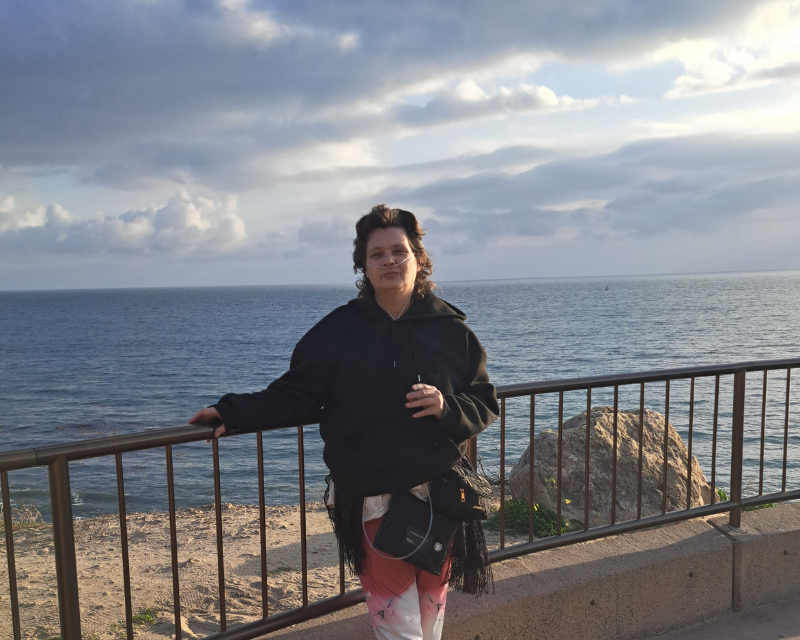
Robust Social Supports are at the center of the referral
pathways survivors need to thrive economically and
emotionally after they get out of their trafficking situation.
Financial abuse is one of the primary ways traffickers enforce control over the people they exploit, and how they profit from that exploitation. Finances are frequently used as means of control by traffickers to prolong exploitation, that is essentially the theft of financial freedom. Therefore, a survivor of human trafficking is a survivor of financial abuse.
Financial abuse can present in many different ways, from controlling how money is spent to evading legal obligations. Survivors of human trafficking most commonly experience forms of financial abuse that intersect with identity theft and fraud. In fact, 53% of respondents in Polaris’ National Survivor Study (NSS) shared that their bank accounts and credit were accessed and used by their traffickers during their exploitation.
As a result of these abuses, survivors are in extremely vulnerable financial circumstances after exiting their trafficking, and can be for many years after their exploitation ends. For example, survivors are twice as likely as the general US population to not have a checking account, and twice as likely to be unable to open a bank account due to identification, personal credit or past debanking from fraudulent activities on their accounts. This lack of access to basic financial tools and services leaves survivors isolated in cycles of vulnerability, which can lead to re-exploitation and even more barriers to stability.
Focus groups conducted with NSS participants also revealed that a majority of services for survivors, including financial access and support services, are concentrated in crisis response (shelter, transportation, law enforcement involvement, for example), typically the first 3-12 months after exit. Few exist to support survivors with their long term access and repair needs, such as credit building and repair. These services are needed to support survivors in sustaining economic stability long-term.
Sign up to learn more about human trafficking and how you can help
Polaris’s vision is focused on more than momentarily alleviating the economic situation of trafficking survivors, it is focused on long-term stability. That’s why, through collaborative efforts with trusted allies, we are working to establish referral pathways for survivors who encounter barriers to financial inclusion. Together, we are addressing the myriad challenges faced by survivors, building a resource ecosystem that benefits them, and fostering lasting systemic changes. Five innovative examples of efforts to increase access to financial products and services include:
- The Debt Bondage Repair Act Guide was co-created by anti-trafficking subject matter experts and stakeholders, and provides step-by-step assistance and template documents for “survivors, service providers, government entities, and law enforcement on navigating the DBRA process.”
- Finance Against Slavery & Trafficking (FAST) Survivor Inclusion Initiative (SII) has brought financial institutions and direct service organizations together to increase access to basic checking and savings accounts. Some institutions also offer products such as debit and credit cards and financial literacy education.
- Survivor’s Guide to Money: How to Use Money as a Tool After it Was Used Against You as a Weapon is a financial literacy curriculum authored and informed by survivors. This curriculum has seen positive outcomes with survivors who independently go through the workbook, and is also used in residential and peer support groups across the US.
- Moore Van Allen’s Online Financial Wellness Tool was co-created with Credit.com and is a customizable platform with online learning modules on topics ranging from foundational financial concepts to financial capability and wealth building, specifically designed for survivors of human trafficking.
- Shyne’s Survivor Business Network provides comprehensive support, valuable resources, and capital for innovative ideas that challenge societal norms and systems by providing survivors with high-level, trauma-informed volunteer coaches to support survivors in wealth-building education opportunities.
There are many ways to get involved with promoting financial inclusion for survivors of trafficking, including supporting organizations that collaborate on this issue, and advocating for inclusive finance policies. Collective action and collaboration is the only way that we can build a more inclusive and equitable financial ecosystem that not only supports survivors of trafficking in gaining stability, but in reaching a stage where they are thriving.
Financial Inclusion: Available and accessible financial products and services. This includes but is not limited to: checking and savings accounts; credit building/repair; mortgages and business loans; building a savings cushion; home, life, and car insurance; remittances to family; paying off debt; personal credit cards and lines of credit; and financial education.
Financial Capability: An individual’s ability to act in one’s best financial interest, no matter their circumstances, to build economic stability.
Economically Thriving: A survivor of human trafficking who is economically thriving is a person who is securely rooted in their community; with sufficient material resources to be able to be in the present without grief, fear, or restraint from the past; and who has what they need to pursue their goals for the future. Economically thriving is having the freedom of unconstrained choices, and possessing the capacity to dream.
Stop human trafficking today
Help fix the broken systems that make trafficking possible so we can prevent it from happening in the first place.



